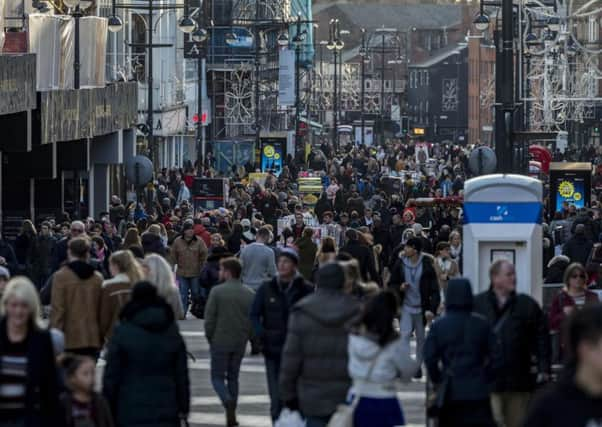Ian Martin: Yorkshire pride can fuel devolution fight


The devolution on offer to places in Yorkshire from the Government is primarily about devolving a limited number of executive powers to a directly-elected mayor exercised over a mostly urban collection of local authorities that they agree to be a ‘functioning economic area’.
These local authorities will scrutinise the mayor by their leadership’s representation in a Combined Authority.
Advertisement
Hide AdAdvertisement
Hide AdThere are some people in Yorkshire who believe that we should take this rare opportunity for decentralising power before it is withdrawn. Some see this model as exactly what is needed, but there are others for whom a Leeds City Region mayor – roughly West Yorkshire – and a Sheffield City Region mayor – roughly South Yorkshire – is the best option for maintaining Labour’s historic dominance of power in the post-industrial West Riding of Yorkshire. Likewise for some, the traditional Conservative dominance of the primarily rural North and East Ridings of Yorkshire is best maintained by not being dependent on votes from the West Riding.
The One Yorkshire proposal from local authorities (with key supporters including trade unions, the CBI and Archbishop of York) accepted the mayor and combined authority model but aimed to apply this to as much of Yorkshire as possible, although Sheffield and Rotherham still prefer a city region model. This is very significant.
Firstly because it managed to bring together a broad coalition of those in the region who already hold power. Secondly because it was regional leaders standing up and not simply accepting the Westminster world view. But thirdly and most of all, it tacitly acknowledged that the Government’s reasons for devolution are not identical to the reasons expressed by people here.
For many people in Yorkshire, their vision is for something different, something usually more ambitious, than that of the Government.
Advertisement
Hide AdAdvertisement
Hide AdThe local authorities’ proposal tried to find a compromise between regional democracy and devolution.
The reasons for the appeal of an all-Yorkshire approach mostly come into two broad areas: the unique nature of Yorkshire and the ambition to do things significantly from the Westminster approach to policy and politics. Some of those opposed to such an approach fear a negative impact from flag waving, appeals to identity and an ‘almost nationalism’ that revels in taciturn old men who say little else but ‘No’ and don’t like anything that’s ‘different’. These are concerns that are worth considering in the same way as they have been in the context of Scotland’s ‘indyref’ and the Brexit referendum. But the evidence suggests that Yorkshire identity is often the least contested and most inclusive form of identity for people living in the region. Surveys suggest the vast majority feel that sense of ‘Yorkshireness’.
This identity is a brand that appeals to those who want to attract inward investment into the region and who want to sell products and services from here to external markets. It is also a sense of belonging that many believe would lead to buy-in from the majority of the population, perhaps even heading off some of the discontent based on identity issues experienced elsewhere. This partially explains the appeal of One Yorkshire to many.
But it’s also the case that Yorkshire has a population bigger than Scotland and an economy bigger than Wales. And for many this creates an opportunity to do things at least as differently from the Westminster model as has been done in Scotland with its modern parliament, proportional electoral system, civic society, new media and policy divergence (primarily in a progressive direction).
Advertisement
Hide AdAdvertisement
Hide AdThis is what Yorkshire Party founder Richard Carter calls ‘first rate devolution’ and he has always compared it with the ‘sixth rate devolution’ offered to Yorkshire. Many outside Yorkshire argue that Scotland is a nation so it is different but I think it’s true to say that nothing gets the backs up of people here more than someone who lives elsewhere telling us what we are and what we’re not.
Some are wary of concentrating power in the hands of a single mayor or of consolidating the power of the existing establishment in the region. But others have the ultimate aim of a Yorkshire Parliament with power to make an impact of the lives of the most vulnerable in the region. Ultimately therefore what’s going on with Yorkshire is a debate about what we want, why we want it, what relationships we want with others and what is realistic or pragmatic or expedient in terms of opportunities, power bases, coalitions of interests, political economy and strategic partisan-political calculations.
What’s going on with Yorkshire is the slow, tentative emergence of regional democracy.
Ian Martin is a founder member of We Share The Same Skies, a West Yorkshire-based regional democracy network.